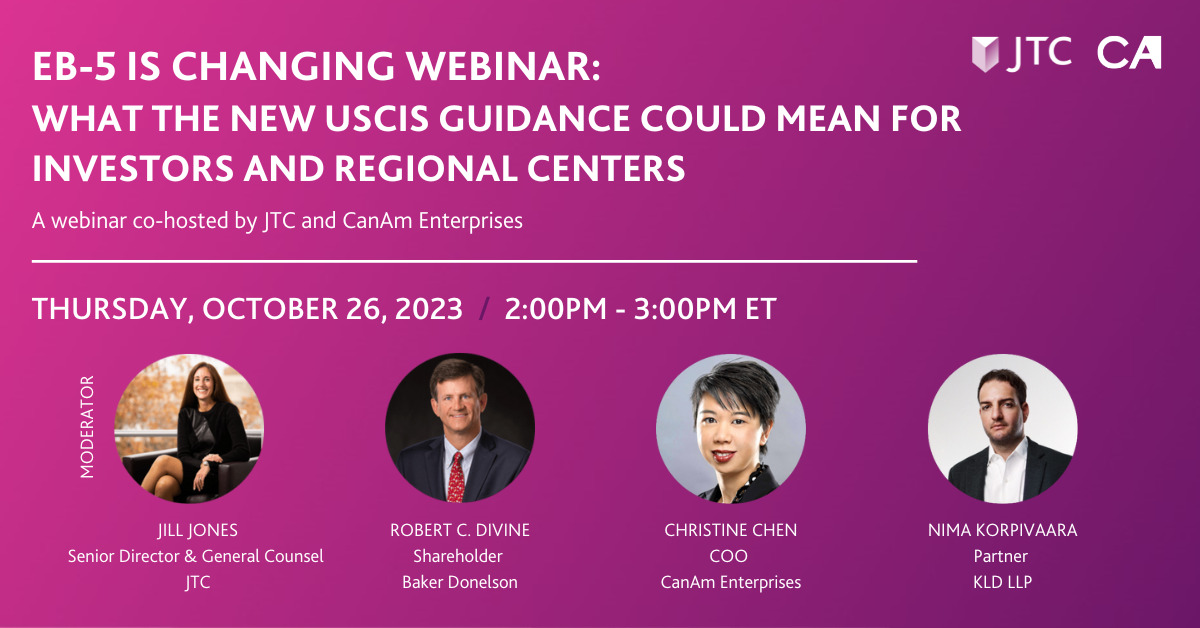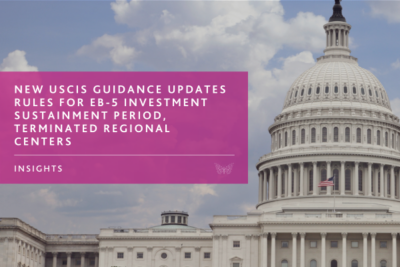As the United States grapples with new political dynamics following recent elections, investors and stakeholders in the EB-5 program are keen to understand the potential changes. In a candid conversation, Carolyn Lee, Principal and Founder of Carolyn Lee PLLC, and Christine Chen, COO of CanAm Enterprises, shared their perspectives on how election results might affect EB-5. Both Lee and Chen emphasized the program’s resilience, underscoring the importance of bipartisan support and the security brought by the recent Reform and Integrity Act (RIA).
How Election Cycles Influence Immigration
Chen initiated the conversation by discussing the concerns foreign investors may have as immigration becomes a politically charged topic.
“There’s so much coverage around immigration,” Chen said. “But a lot of it focuses on illegal immigration, whereas EB-5 is very different—it’s about legally investing in the U.S. and generating jobs.”
Lee agreed, acknowledging that immigration has become a significant issue for voters. “This election has shown that immigration is top-of-mind for Americans,” she explained. “And while we might see some changes in policy or enforcement around the border, I believe business-based immigration, like EB-5, will remain largely unaffected.”
The two discussed how the EB-5 program, which is designed to foster job creation and economic growth, operates in a distinctly bipartisan space. Both believe this bipartisan support will be crucial in maintaining stability within the EB-5 program, regardless of political shifts. “Creating jobs and strengthening the economy—those are goals that resonate across party lines,” Chen added.
The RIA as a Safeguard Amid Potential Policy Changes
A central theme in the conversation was the importance of the RIA, enacted in 2022, which introduced reforms to improve processing efficiency and protect investors. Lee stressed that the RIA’s new guidelines and structural changes would provide stability for the program, even if other immigration policies face revisions under new leadership. “The RIA is statutory, and it’s still relatively new,” she noted. “It would be quite imprudent to disturb it.”
With RIA reforms, EB-5 applications now benefit from faster processing times, which is a major relief for investors. “Thankfully, RIA mandates priority processing, especially for rural and targeted projects,” Chen said, emphasizing that “any future administration would likely see the value in maintaining these improvements.” Lee concurred, noting that the RIA provides a foundation that ensures EB-5 can operate efficiently despite shifting political priorities.
Read More: Post-RIA EB-5 I-526E Data Trends: Insights and Implications for Investors and Stakeholders
Political Shifts and International Investor Confidence
The political landscape, especially concerning U.S. relations with countries like China, has left some investors concerned about their applications’ security. Lee addressed these concerns, pointing out that geopolitical tensions often inspire a mixed response among foreign investors.
“For some, tensions create a sense of urgency—‘get over there now’—while others may feel a bit wary,” she said. Chen added, “The reality is that day-to-day EB-5 processing is more stable than the news headlines might suggest.”
To reassure investors, Chen noted that broader U.S.-China relations generally do not affect EB-5 adjudications, as the program operates independently of diplomatic tensions. “What you hear on the news doesn’t always translate into real impacts on the ground,” she explained. “There are thriving, diverse immigrant communities here, and that’s not changing.”
Lee and Chen also highlighted how EB-5’s resilience is rooted in its economic purpose: the program is specifically designed to create U.S. jobs through foreign investment. This purpose makes it more resistant to political changes that may otherwise impact other visa categories. “The U.S. is committed to economic growth, and EB-5 directly aligns with that goal,” said Lee.
Bipartisan Support as EB-5’s Backbone
Lee and Chen both agree that EB-5’s bipartisan backing has helped shield the program from political turbulence. As Lee explained, “EB-5 enjoys bipartisan support because it’s about jobs, not just visas. It’s seen as a valuable economic tool.” The RIA, which passed with strong bipartisan approval, demonstrates the consensus around EB-5’s benefits.
Chen elaborated, “EB-5 represents a win-win for investors and the U.S. economy. Investors gain a legal path to residency, while Americans see increased job opportunities and economic growth.” This bipartisan appeal, she believes, will allow the program to thrive regardless of changing administrations.
Impact on Student and H-1B Visa Holders
The conversation then turned to students and H-1B visa holders, who often turn to EB-5 for a more secure path to U.S. residency. Chen highlighted the popularity of EB-5 among students who complete their education in the U.S. and want a pathway to permanent residency. “For those who have spent years studying and working here, EB-5 offers a stable, long-term solution,” she said.
Lee echoed this sentiment, noting that the EB-5 pathway is particularly appealing for students who have completed OPT (Optional Practical Training) and are seeking a more status in the U.S. “EB-5’s alignment with job creation and economic growth makes it an attractive choice for high-skilled workers and recent graduates alike,” she explained. Both emphasized that while broader immigration policies may fluctuate, the EB-5 program’s legal framework offers stability for those pursuing this route.
The H-1B to EB-5 transition has also gained traction, especially as the H-1B visa category remains highly competitive and uncertain. “With layoffs in tech and the lottery-based nature of H-1B, many skilled professionals are now exploring EB-5 as a stable alternative,” Lee remarked.
Read More: Navigating U.S. Immigration Options Post-Graduation: A Focus on EB-5 Program
Long-Term Outlook and Continued Support for EB-5
As the discussion concluded, both Lee and Chen reaffirmed their confidence in EB-5’s ability to weather political shifts. Chen observed that the program’s appeal is rooted in its economic impact. “EB-5 is a model of how immigration can boost economic growth, create jobs, and bring foreign investment—all at no cost to taxpayers,” she said.
Lee added that the RIA’s reforms ensure that EB-5 remains secure and well-regulated. “We’ve lived through multiple administrations with the EB-5 program, and its continued bipartisan support has allowed it to survive and thrive,” she said. Both believe that the RIA’s improvements have set EB-5 on a stable course for the foreseeable future.
Ultimately, Lee and Chen’s conversation underscored EB-5 as a practical, sustainable option for investors seeking U.S. residency. Despite potential shifts in political priorities, EB-5’s alignment with U.S. economic goals and its well-regulated framework under the RIA provide reassurance for stakeholders. “Creating jobs and strengthening our economy—those are values everyone can get behind,” Chen concluded, reflecting on the unique resilience of the EB-5 program amid changing times.




